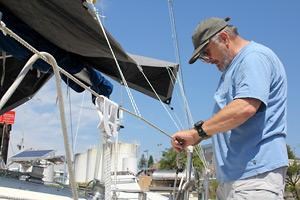Though summer is the time for up-the-lake trips and ocean adventures, water safety is often only an afterthought. Powell River Canadian Coast Guard station is encouraging people to be more cautious in and on the water, and for good reason—drownings in Canada are on an upswing.
Although there has been significant long-term progress in reducing Canadian drowning deaths, a report put together by the Lifesaving Society shows a short-term rise. The report shows the average number of drownings in the last five years has increased eight per cent when compared to the previous five years.
News is not all bad though. The report also shows that drowning deaths in British Columbia have actually gone down in the last five years, as well as the number of boat-related deaths.
Despite these gains, Officer In Charge Ray Barnes of the Powell River station would like to remind people that the water can be a hostile place.
“If you want to go for a drive in your car...if something goes wrong you can pull over to the side of the road, use your cellphone and get some help,” he explained. “You can’t pull over to the side of the road if you’re in a boat.”
Barnes stressed the importance of planning before a boat trip. It’s critical to check water, wind and tidal conditions, while using your common sense, he explained. “If the day is lousy, the weather’s bad, don’t go. Plan a different holiday.”
Another important precaution is to make sure that your equipment works and that everyone on the boat knows how to operate it, he continued. This includes the boat, engine, radio and, of course, life jackets.
The society’s drowning report showed that 79 per cent of people who died in boating accidents weren’t wearing any kind of personal flotation device. “We’ll always go back to having life jackets for everybody,” Barnes emphasized. “Make sure they fit and make sure they’re in good condition.”
Another thing people often forget, Barnes added, is a fire extinguisher. “If you’re going to have gas in your boat, or something like a propane stove, make sure you have fire extinguishers and make sure that they work,” he said. “The worst thing in the water is a fire.”
Barnes also emphasized that communication is key. “Let someone know where you’re going and when you’re going to be back,” he explained. Barnes advised using a sail plan, a sheet detailing an expedition’s start and end date, destination and other useful information, which is given to family or friends staying back home. “That way, if you’re overdue, they can call the rescue centre,” he explained.
Barnes strongly advised boaters to pick up Transport Canada’s Safe Boating Guide, available for free at the Coast Guard office, located on the corner of Courtenay Street and Willingdon Avenue, and various other locations around the city. Coast Guard workers will also be happy to answer any questions, he added.
Barnes explained water safety can be narrowed down to a simple phrase. “In a nutshell, ask yourself, ‘What will I do if something goes wrong?’”



